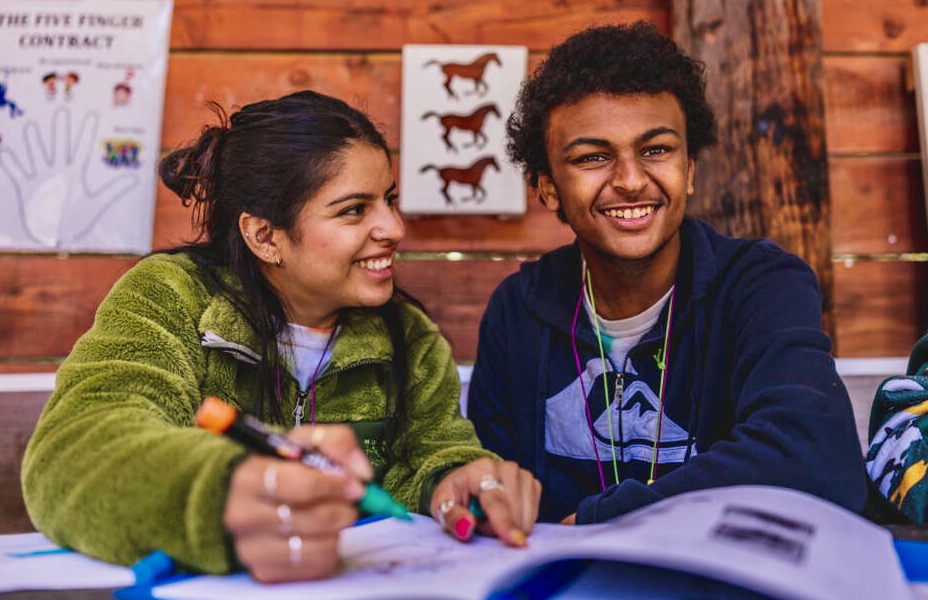+ Personal Assistance to Campers
Personal Care
You will be caring for the camper(s) you are paired with as part of a team that includes nurses and qualified, experienced MHKC staff. Use their knowledge, their help and support. Never hesitate to ask questions about how best to provide personal care for a camper – this includes asking the camper themselves! Many of our campers are able to tell you what works best for them when it comes to personal care. It is both a requirement of the American Camp Association (ACA), and a best practice in camps around the country to avoid one-on-one contact with campers. For the safety and protection of campers, counselors and staff, Mt. Hood Kiwanis Camp does not permit one-on-one camper/staffer or camper/counselor contact. In situations that require personal interaction, the exchange is to be conducted in view of other adults or youth. Personal care and strategies for safely and appropriately handling the physical needs of the camper(s) you are paired with will be thoroughly reviewed during your counselor training session prior to the camper’s arrival at camp.
Self Care: As a counselor, you will be pulled in every emotional direction. It is very important to understand yourself and be able to ask for help when needed. Being a counselor will require you to step outside of your comfort zone but in return you will gain so much knowledge and understanding about other people and yourself. Make sure you take time for yourself in the morning, during break, and at the end of the day.
You WILL be supported at Camp!
There are many people at camp who are there to support you in different ways. Always talk to your Counselor Supervisor (CS) and Assistant Counselor Supervisor (ACS) if you have any concerns.
Important!
-
- Every camper is an individual who should be treated like everyone else.
- We need to let each camper have success and do as much as they can for themselves in as many activities as possible.
- It is important to know how to safely and appropriately provide personal care assistance. Ask staff for help or advice. Staff are there to help you succeed.
- No one should ever be alone with a camper or Jr. Counselor. Always have a third person who is either a counselor (over 18 years old) or staff member. This rule applies to everyone.
Feeding and Nutrition
- Review the camper’s dietary needs prior to each meal.
- Do food items meet dietary needs of the camper – low fat, low sugar, allergies, etc.?
- Serving – do they need prompts to cut their food, take smaller bites, slow down (to reduce choking)?
- Does the camper need a special consistency of food: pureed, ground, chopped, moistened?
- Do they use any adaptive dining equipment (large handled spoon, high sided plate?)
- Be sure to offer condiments.
- If you have any questions or concerns about the camper’s diet or adaptive equipment, be sure to consult your CS, Directors, or the camp nurse.
Dressing and Undressing
- Let the camper do as much as possible. Don’t treat campers like children or act like they are helpless.
- Some campers/camper families have specific gender preferences when it comes to those who assist them during personal care.
- Allow campers to dress independently. Don’t stand and watch; allow them to do so in private or with as much privacy as possible.
- Help or assist with dressing and undressing when all other options have been tried.
- Assist campers in dressing appropriately for the current weather conditions. If you are cold or hot, chances are the camper would be as well. When you layer up or take off layers, ask the camper(s) you are paired with how they are doing.
Toileting
- Campers should be encouraged to be as independent as possible before assistance is given.
- When assisting someone on the toilet, turn your head or back to give them privacy. If less assistance is needed, leave the stall and close the door. Let the camper know you will be nearby if they need assistance.
- Counselors and staff should ALWAYS wear gloves, and strictly avoid skin-to-skin contact when assisting with personal care.
Showering and Bathing
- Always keep gloves, towels, etc. between you and the camper.
- If the camper needs minimal shower assistance, let them do as much as possible. Do not assume they need full assistance; some campers may only need verbal prompts or no assistance at all. Always keep showering as private as possible.
Paperwork
Although paperwork may not be the most exciting part of camp, it is very necessary. Many of the campers who attend Mt. Hood Kiwanis Camp receive financial assistance from county or state agencies. Those agencies require that camper paperwork be completed carefully and thoroughly. Our failure to do so may jeopardize a camper’s ability to continue receiving public assistance with their fees to attend camp.

Paperwork completion also helps track campers’ progress year after year in their recreation skills. In addition, it allows us to gain more information on the best way to interact with campers next year. Complete each form so that someone who has never met that specific camper could picture what they are like.
